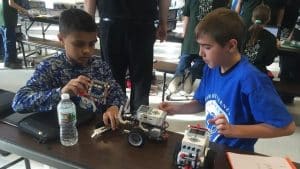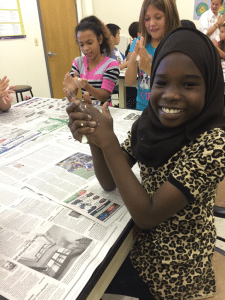Our Quest to Personalize Competency-Based Learning in New Hampshire
CompetencyWorks Blog
This article was was originally posted on January 9, 2018 at Education Week in the Next Generation for Learning blog.

New Hampshire’s Assessment for Learning Project (ALP) has been a quest to deepen and personalize competency-based learning for all students. During the 2016-2017 school year, we attempted to confront two significant barriers hindering the advancement of competency-based learning, namely age-based grade level configurations in schools and traditional assessment and grading practices that restrict students from “moving on when ready,” a key tenet of competency-based learning.
Our five pilot elementary schools intentionally implemented innovative practices that blurred the lines between grade levels by moving to multi-grade bands. Teachers developed learning progressions that guided learning for individual students within these bands and helped to foster assessment practices as integral components of the learning process, rather than as strictly summative measures of learning.
This “No Grades, No Grades” (NG2) initiative included DJ Bakie School (Sanborn Regional School District), Maple Street Magnet School (Rochester School District), Memorial School(Sanborn Regional School District) Parker Varney Elementary School (Manchester School District), and Pittsfield Elementary School (Pittsfield School District).
All five schools also participated in New Hampshire’s Performance Assessment of Competency Education (PACE), a first-of-its-kind assessment and accountability system that puts teachers at the center of instructional and performance assessment design, development, and implementation. PACE tasks are given to a single grade level of students at the same time, and each task is administered, monitored, and guided by teachers. As we reflected on these practices, we identified the need to explore ways to deepen our efforts to meet the needs of ALL learners by personalizing our competency-based learning and assessment system and putting students at the center of the learning and assessment process. NG2 took a giant step in this direction.
Last summer, our five NG2 pilot schools came together with facilitators from the New Hampshire Learning Initiative and 2Revolutions to share their learning from the past year. Each of these five schools, in very different ways, piloted an aspect of innovation to increase student agency in learning.
We captured our stories and insights from our NG2 pilot year in this podcast from 2Revolutions:
As the teams across schools collaborated and shared successes and challenges, two levers stood out as having significant impact on student learning: grade bands and Work Study Practices.
Grade Bands
Two of our schools–Parker Varney and Pittsfield–implemented a multi-age grade band model for the entire year. These bands varied by school and within schools. The outcomes, however, were common. When provided opportunities for learning within their developmental sweet spot (where they were challenged but not in over their head), students made tremendous progress. This was reinforced from the perspectives of both students and parents.
For example, teachers in Pittsfield focused specifically on developing learning progressions for each multi-grade band to meet students where they were in various content areas. Pittsfield educators sought feedback from parents of students within these bands and received comments such as: “I was skeptical at the beginning of the year that this room was going to work for Z… He still struggles, but I feel that he has made great improvements both academically and socially this year. I think his confidence is boosted when he is paired with kids that are at his level, and the curriculum is meeting him at his level. I really like the concept of this classroom.”
Another parent reported: “It really allows for students to be met where they are.”
Multiple data points from both schools indicated a clear increase in student learning within and across various demographics, reinforcing that students who are provided opportunities to work at their level with appropriate support and to engage as agents of their own learning will learn at higher levels.
Work Study Practices

New Hampshire refers to the 21st Century Skills as Work Study Practices (WSP). With an increased focus on integrating WSP into curriculum, instruction, and assessment, students began developing their communication, creative problem solving, collaboration, and self-directed learning skills. This focus had a profound impact on the teachers as well as the students. It led many of our teachers to identify Work Study Practices as the critical lever moving forward in providing students with the tools to develop greater agency in their learning.
Jennifer Manning, a kindergarten teacher from Memorial School, reflected that “Students’ choice can lead to increased engagement and more ownership for individual learning. We had a loose plan for students and their work in the project. I have seen students be engaged by taking the lead on where their learning will progress. I had to overcome how uncomfortable this felt but letting students take the lead has been powerful for all of our learning.”
Many of us considered how the increased focus on these critical competencies could lead to increasing equity in our schools, our focus for our ALP project’s second year. Clearly, integrating Work Study Practices and highlighting adult learning as critical competencies were powerful forces for change in our classrooms.
Moving Forward: Student Agency and Equity
Our ALP effort has evolved significantly based on our first year’s work. The New Hampshire Learning Initiative, partnering with the New Hampshire Department of Education, the National Center for the Improvement of Educational Assessment, and Envision Learning Partners, has expanded our efforts for the next two years with a two-pronged approach to personalizing competency-based learning, one focused at the primary level and the other at secondary. The essential question that guides our work is: How can students and teachers collaborate to co-design learning and assessment?
For the primary grades our focus is on developing greater student agency and equity through students and teachers co-designing curricular units, including formative and performance assessments that integrate Work Study Practices and are based on learning progressions. Our goal is to develop competent and confident students. Additional schools have joined the five pilot schools from last year as part of this “NG2: Next Generation Collaborative Learning Design” project.
Simultaneously, an additional cohort of mostly secondary schools new to the project is focused on further developing student exhibition opportunities. Our collaborative learning design model guides this work to engage students and teachers in collaboratively designing student demonstrations of learning that increase student agency and equity. Eventually, the resulting co-designed assessments and student exhibitions from both cohorts will be incorporated into PACE.
In New Hampshire, we believe in learning by doing. Our teachers recognize that change is not going to happen overnight and have taken the lead in affecting change within their classrooms, grade levels, and schools. NG2 is reflective of this learning culture. Participating teachers are learning from and with each other about what has a positive effect and what has been a struggle. They also are learning to provide opportunities for ALL students to experience success in meaningful ways and to develop the knowledge, skills, and agency necessary for success in today’s world.
See also:
- 3 Lessons Learned from PACE
- Amidst Opioid Addiction, Plummeting Morale, One Elementary School Reinvents Itself
- Goodbye ABCs: How One State is Moving Beyond Grade Levels and Graded Assessments
Jonathan G. Vander Els is the Director of Innovative Projects for the New Hampshire Learning Initiative and Debra Holloway is an independent educational research consultant for New Hampshire’s NG2 Project.